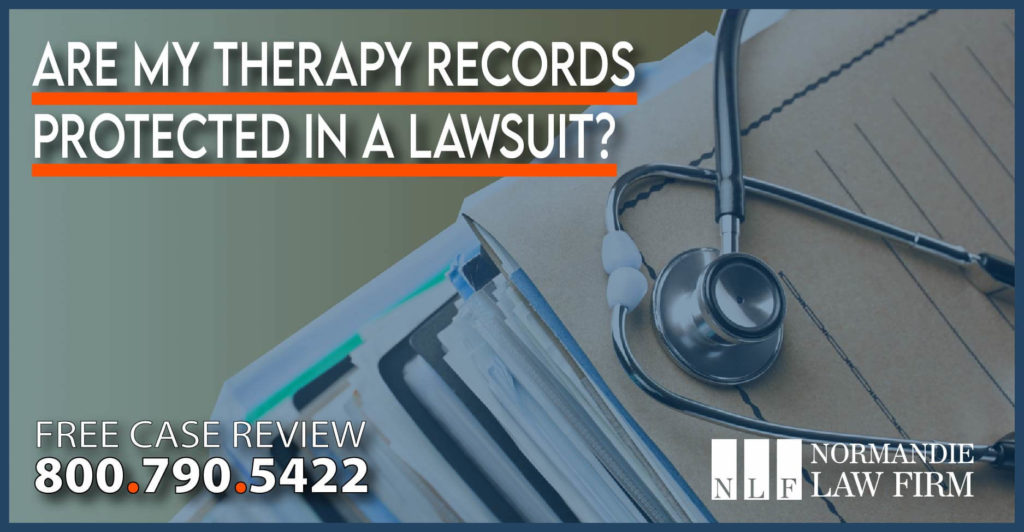This is a tricky area of personal injury law, and even experienced therapists are confused about what to do at times. Legally, both sides in a lawsuit have the right to investigate all claims that are made by the plaintiff. For the defense, they’re trying to avoid paying you, and the only way they can do that is to argue the severity of your physical and mental injuries. However, the defense’s right to information cannot override the plaintiff’s right to privacy when it comes to their mental health records.
Today, we will talk about how that balance is achieved in the California court system. Additionally, we will go over related questions that may be on your mind:
- Is my therapist legally obligated to turn over my therapy records?
- Can I decide which parts of my therapy records are turned over?
- What are my rights if my lawyer refuses to protect my mental health records?
Please keep in mind that the laws and general practices we will cover may not apply to your situation. Each lawsuit has its own set of circumstances, which you should discuss with a knowledgeable attorney. If you have questions or concerns about anything you read here today, please give us a call at our office.
California’s Law on Therapist – Patient Privilege
The protection of a patient’s therapy records are explained in California’s psychotherapist-patient privilege, Evidence Code 1014, which states:
“…the patient, whether or not a party, has a privilege to refuse to disclose, and to prevent another from disclosing, a confidential communication between patient and psychotherapist if the privilege is claimed by: (a) The holder of the privilege. (b) A person who is authorized to claim the privilege by the holder of the privilege. (c) The person who was the psychotherapist at the time of the confidential communication…”
That sounds pretty straight-forward, doesn’t it? It’s your right to refuse the release of your therapy records, and furthermore, your therapist or ex-therapist can’t turn them over without your permission. That’s why most metal health practitioners immediately decline defense motions for mental health records, citing that it’s their right to do so under the psychotherapist-patient privilege. But there’s a catch to this privilege when you file a personal injury lawsuit. To learn about exceptions to the client-therapist privilege, please keep reading.
Our Recent Verdicts and Settlements
$295,000
$250,000
$1.5 Million
$1.1 Million
$734,851
$460,000
Garden Variety Claims versus Special Claims
As we mentioned, communications between patients and mental health providers are generally protected under California laws. But when the patient seeks monetary damages, their health – including their mental health – are called into question. Specifically, personal injury lawsuits ask for non-economic damages, like pain and suffering .This form of damage compensates a victim for emotional distress, which can be significant in traumatic accidents like fires and car crashes. But proving a case for pain and suffering may require you to disclose your therapy records.
However, you can get around this by claiming “garden variety” damages, meaning you are not asking for pain and suffering beyond what is normally expected for your type of accident. On the other hand, if you are making a “special” claim for damages, you are requesting emotional damages that are beyond the normal range for the injuries you’ve suffered. If you are asking for special damages, it’s possible that your therapy communications would need to be turned over to the defense.
But even if such records have to be turned over, your lawyer should do everything they can to limit the types of communications that the defense has access to. If they’re not taking every available measure to protect your mental health information, that’s a bad sign of their commitment to you as a client. It may also indicate their lack of knowledge regarding therapist-patient privilege, or inexperience with your type of your lawsuit. Staying with such an attorney can negatively impact the outcome of your case, so if you find yourself in this situation, please give us a call right away. There are legal actions you can take against unethical or incompetent attorneys, but you should consult a lawyer ahead of time to ensure that you’re doing the right thing.
What Counts as a Psychotherapist in California?
The state of one’s mental health may be discussed with many individuals, ranging from friends and co-workers to family doctors. This is important to note, as only “psychotherapists” are protected under Evidence Code 1014. According to the code, psychotherapists include:
- Psychiatrists
- Licensed psychologists
- School psychologists
- Marriage and family therapists
- Clinical social workers approved for non-medical psychotherapy
- Licensed clinical counselors
- Psychology interns and assistants, working under a licensed therapist’s supervision
- Social workers in training that are working under a licensed therapist’s supervision
- Registered nurses that are listed by the state board as mental health nurses
Confidential communications, like therapy records, between these professionals and their patients are protected under the laws of patient-therapist privilege. The privilege also applies to communications during group sessions that are conducted by one of the above individuals. For more information on psychotherapist-patient privilege and how it applies to your case, contact our office and speak to one of our attorneys.
What to do if your Lawyer is not Protecting your Mental Health Records
As stated in a previous section, the defense may have a right to your therapy records depending on the amount of emotional damages you are claiming. But if you’re making a “garden variety” claim for emotional distress, there should be no legitimate reason for the defense to have access to those records. That’s certainly the argument we use when we object to the defense’s request for a client’s therapy notes. But even if you’re asking for special damages, your lawyer should be fighting to limit the types of information that can be disclosed.
If your lawyer is not taking the proper steps to protect your mental health records, you have a few options. The first one is to file a complaint with the State Bar of California. This agency is responsible for investigating and taking action against lawyers that violate the codes of professional conduct. Their complaint form is available online, or you can call their hotline at 800-843-9053. While you may be reluctant to report your attorney, not protecting a client’s therapy records is a serious violation that must be investigated immediately. However, an investigation takes time, which still leaves you with an attorney that’s not protecting your rights.
The more effective solution is to find a new lawyer, and to do it as soon as possible. You may have thought about this already, but are not sure if you’re able to fire your attorney in the middle of a case. Fortunately, California laws permit litigants to find new counsel at any point during a lawsuit. But choosing a new lawyer isn’t as simple as picking out a new pair of shoes. To help you make the best decision for your case, let’s talk about the process for selecting a new attorney.

How Can I find a new Attorney?
Even if you’re 100% sure that you want to fire your lawyer, you should discuss the pros and cons of doing so with an experienced personal injury attorney. Before you decide on anything, please give us a call and schedule a free second opinion with one of our lawyers. This is a chance to talk about all the problems you’re having with your lawyer, which may go beyond their inability / refusal to protect your mental health records. Here are some issues that typically come up during a second opinion consultation:
- My lawyer takes forever to reply to my calls and emails.
- I think my case is worth more than what my lawyer is telling me.
- My lawyer keeps asking for information or paperwork I’ve already provided.
- I just found out we missed a filing deadline, and now my case may be dismissed.
Our lawyers can assist you with these, and any other concerns regarding your lawyer’s service. If, at the end of our consultation, you would like to switch over to us, we’ll take care of all the work related to the transfer. That way, there’s no awkward tension between you and your former lawyer. We can also help you file a complaint with the State Bar if you haven’t done so already. In fact, it may be best to wait on this until you find a new lawyer, since they can ensure that everything is filled out correctly.
To learn more about your rights and legal options if you’re unhappy with your lawyer, contact our office and schedule a free second opinion.
Can I Sue my Lawyer for not Protecting my Mental Health Records?
We do our best to avoid vague answers, but we would have to say “maybe” when it comes to this question. In order to sue your attorney, you would need to have a case for legal malpractice.
Legal malpractice is defined by 4 elements:
- Duty: Your lawyer had a specific duty to you as a client.
- Breach: Your lawyer breached that duty as a result of negligence.
- Causation: Your lawyer’s negligence caused financial loss.
- Damages: You suffered hardships as a result of that financial loss and deserve to be awarded damages by the court.
The first two parts are easy to prove in many cases. For example, your lawyer had a duty to protect your mental health records, and breached that duty through some form of negligence (misunderstanding the law, failing to file an objection, etc.). But causation and damages are much harder to show. For one thing, you would have to prove that your ability to recover damages was compromised by your lawyer’s conduct. You may also have to show that the outcome of your case would be different had you worked with another attorney. These elements would be difficult, if not impossible, to prove unless your case is dismissed or settled.
That’s why moving on to another lawyer may be the best choice if your attorney is failing in their duty to protect your mental health records. The last thing you want is to have your case dismissed, or end up with a settlement that’s inadequate for your needs. To avoid either of these traps, please schedule a free second opinion with the one of our lawyers.
Normandie is Here for You
It’s a scary prospect to know that someone may be able to access your mental health records, especially when you’re suffering with the physical and mental injuries from an accident. It’s a lawyer’s duty in these cases to take any and all available actions to protect their client’s right to privacy. Sadly, less diligent and experienced attorneys may not take such actions, thereby leaving their clients vulnerable and traumatized by the very people who are supposed to protect them.
At Normandie, we treat our clients like family. We will fight aggressively to limit access to your therapy records, just as we would do for our family members. Additionally, we will fight to recover a fair and balanced settlement award based on your specific needs. Finally, we will never bill you upfront for any of our services. With our Zero fee guarantee, the only way we get paid for our work is if we win your case. And if we fail to bring you the compensation you deserve, there is absolutely no cost to you, even if your case goes to trial. That means there is no risk to you by coming in to see us for a free consultation or free second opinion.
If you’re in need of a lawyer who sees you as family and not a case number, please don’t hesitate to give us a call.












